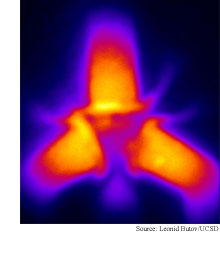
 |
 |
 |
 |
Excitons
juice up light switches
 A
more efficient generation of circuits that control telecommunications light
signals could be on the way following the development of an excitonic integrated
circuit. An exciton is an electron and a hole -- a positively charged gap
where a negatively charged electron can reside -- in a briefly stable orbit
around each other.
A
more efficient generation of circuits that control telecommunications light
signals could be on the way following the development of an excitonic integrated
circuit. An exciton is an electron and a hole -- a positively charged gap
where a negatively charged electron can reside -- in a briefly stable orbit
around each other. Photons enter the device and transform into excitons, which are then controlled in the same way that ordinary circuits direct the flow of electrons. Excitons are transformed back into photons at the device's output.
The more efficient optoelectronic devices promise faster communications networks.
Research paper:
Control of Exciton Fluxes in an Excitonic Integrated Circuit
Science, published online June 19, 2008
Researchers' homepages:
Butov Group
Arthur C. Gossard
Related stories and briefs:
Silicon nanocrystal transistor shines
Nanotube shines telecom light
Back to TRN June 23/30, 2008
View from the High Ground Q&A
How It Works
RSS Feeds:
News
Ad links: Clear History
Buy an ad link
© Copyright Technology Research News, LLC 2000-2008. All rights reserved.